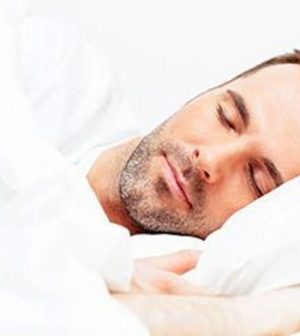- Could Artificial Sweeteners Be Aging the Brain Faster?
- Techniques for Soothing Your Nervous System
- Does the Water in Your House Smell Funny? Here’s Why
- Can a Daily Dose of Apple Cider Vinegar Actually Aid Weight Loss?
- 6 Health Beverages That Can Actually Spike Your Blood Sugar
- Treatment Options for Social Anxiety Disorder
- Understanding the Connection Between Anxiety and Depression
- How Daily Prunes Can Influence Cholesterol and Inflammation
- When to Take B12 for Better Absorption and Energy
- Epsom Salts: Health Benefits and Uses
As Clocks Spring Forward, Keep Sleep on Track

You may only worry about losing an hour of sleep when the clocks spring forward this Sunday, but the time change can also be dangerous for your health, an expert says.
Research shows that the risk of stroke, heart attack and traffic accidents all increase in the days following the switch to daylight saving time, according to James Wyatt, a clinical sleep disorder specialist at Rush University Medical Center in Chicago.
“Among the sleep science community, there is no controversy: The consensus is that we should eliminate daylight saving time and stick with standard time permanently,” Wyatt said in a university news release.
Time changes affect your body’s natural circadian rhythms, which help your brain signal that it’s time to go to sleep and also control many other organ systems.
“We have clocks throughout the body,” Wyatt explained. “A special region in the hypothalamus regulates our circadian rhythms and acts as the master pacemaker, telling us, ‘Here’s daytime, so do this, now it’s nighttime, do that.’ Our organ systems have to change their function, depending on what time of day it is.”
For example, he explained, “Our gut digests more at night and less during the day, urine production reduces in the evening so we can sleep through the night more easily, our temperature is higher during the day than at night, and all of this is regulated by our circadian rhythm.”
Interruption of those rhythms by events such as time changes, traveling across time zones and working rotating shifts triggers a stress response in the body.
“Many people plan to go to bed an hour early when the clocks change, but they rarely do,” Wyatt said. “That means you’ve just lost an hour of sleep and your circadian rhythms are misaligned, which explains why we see an increase in accidents after daylight saving time begins.”
You can reduce the impact of the spring time change by planning a few days in advance, Wyatt suggested.
“The simplest way to manage the springtime shift is to go to bed and get up 30 minutes early on the Friday immediately before the time change, [March 11],” he said. “Then, shift it 30 minutes earlier for the following night. By Sunday’s time shift, you’ll be back onto your regular schedule without suddenly losing an hour of sleep.”
Breaking up the one-hour time shift into two 30-minute shifts helps your body adjust to the new time schedule while reducing strain on your circadian clock.
More information
There’s more on daylight saving time at the U.S. Centers for Disease Control and Prevention.
SOURCE: Rush University Medical Center, news release, March 7, 2022
Source: HealthDay
Copyright © 2026 HealthDay. All rights reserved.










